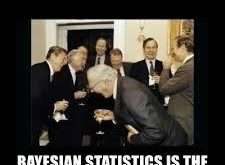Read More »
Nine years with euro crisis – time to think anew
from Trond Andresen, Steve Keen and Marco Cattaneo and the current issue of WEA Commentaries A new means of payment can be part of the solution for the eurozone’s unemployed. We have now seen nine years of social crisis and huge unemployment in many euro countries. An entire youth generation has barely experienced anything but being out of work. Still no solution has been found or implemented. The time is overdue to think outside the box. We propose a solution that has circulated...
Read More »Bayesianism — a patently absurd approach to science
from Lars Syll Back in 1991, when yours truly earned his first PhD with a dissertation on decision making and rationality in social choice theory and game theory, I concluded that “repeatedly it seems as though mathematical tractability and elegance — rather than realism and relevance — have been the most applied guidelines for the behavioural assumptions being made. On a political and social level, it is doubtful if the methodological individualism, ahistoricity and formalism they are...
Read More »The public economy in crisis
from W. Milberg and the current issue of the RWER With the Trump tax cuts of 2017, the disconnect in popular discourse between government spending and taxing became more or less complete. Rate (and revenue) cuts were considered politically appealing, independent of any imagined social goal that might require public financing. It constituted an end to the debate over the government spending required to attain social goals and the analysis of the tax rates and regulations needed to finance...
Read More »US median household income in the 21st century
A comment on corporations
from Peter Radford and the current issue of RWER There is a continuum between the abstraction of economics theory and the practice of business. The two, after all, coexist in the same domain. The one seeks to explain phenomena which are consequences of the other. In the past few decades the highly stylized version of the firm that exists in economic theory has deeply influenced the way in which business is practiced. This is despite the detail excluded in theory, and the evident...
Read More »Is ‘modern’ macroeconomics for real?
from Lars Syll Empirically, far from isolating a microeconomic core, real-business-cycle models, as with other representative-agent models, use macroeconomic aggregates for their testing and estimation. Thus, to the degree that such models are successful in explaining empirical phenomena, they point to the ontological centrality of macroeconomic and not to microeconomic entities … At the empirical level, even the new classical representative-agent models are fundamentally macroeconomic in...
Read More »Resolutions to improve debates on economic policy in 2019
from Dean Baker and WEA Commentaries Okay, it’s that time of year when we are all supposed to commit ourselves to performing nearly impossible tasks over the next twelve months. I will play the game. Here is the list of areas where I will try to bring economics into economic policy debates in 2019. 1) Patent and copyright monopolies are government policies: This one is pretty simple, but that doesn’t mean it is easy. It should be pretty obvious that these and other forms of intellectual...
Read More »Pension funds and the search for alternative assets
from Maria Alejandra Madi A decade after the 2008 global crisis, some key trends can be highlighted: a) There has been a shift to defined contribution (DC) pension plans, b) The increasing role of alternative assets, such as private equity, among pension assets. Many governments in OCDE countries have been committed to structural reforms in labour markets and pension plans. As a result, the current era of austerity has deep impacts on the diversification of types of pension plans....
Read More »“The economics profession is facing a mounting crisis of sexual harassment, discrimination and bullying”
from yesterday’s New York Times The economics profession is facing a mounting crisis of sexual harassment, discrimination and bullying that women in the field say has pushed many of them to the sidelines — or out of the field entirely. Those issues took center stage at the American Economic Association’s annual meeting, the largest gathering of the profession, last weekend in Atlanta. Spurred by substantiated allegations of harassment against one of the most prominent young economists in...
Read More » Real-World Economics Review
Real-World Economics Review




